This post builds on the research article “Counterfeiting the Nation? Skopje 2014 and the Politics of Nation Branding in Macedonia,” which was published in the February 2013 issue of the Society’s peer-reviewed journal, Cultural Anthropology.
Editorial Footnotes
Cultural Anthropology has published many articles on citizenship and neoliberalism, including "Flexible Citizenship in Dubai: Neoliberal Subjectivity in the Emerging 'City-Corporation'" by Ahmed Kanna, "The Face of Money: Currency, Crisis, and Remediation in Post-Suharto Indonesia" by Karen Strassler, "Empty Citizenship: Protesting Politics in the Era of Globalization" by Ritty Lukose.
Cultural Anthropology has also published many articles on postsocialism, including "Repossession: Notes on Restoration and Redemption in Ukraine's Western Borderland" by Karolina Szmagalska-Follis and "Performing Modernity" by Louisa Schein.
Interview with Andrew Graan
Drew Haxby: A main topic in your article is a debate over how Skopje 2014 will be received by the international community. Is this community understood to be uniform? Is it metonymical with the UN, the West or Europe, or does the community extend farther than that? How has this conception of the international changed in reaction to the Republic of Macedonia's conflict with Greece?
Andrew Graan: In Macedonia, as elsewhere, the term “international community” (megjunarodna zaednica in the Macedonian language) is typically understood as a euphemism for the global power bloc dominated by the United States and the European Union. For example, Russia, China, etc. are generally not considered to be part of this group. That said, the composition and character of the international publics imagined for Macedonia can and do vary. At present, I would argue that Macedonian state policies, such as those materialized in the Skopje 2014 development project, target an international public conceived of in economic terms, i.e., an elite public of tourism and investment capital. Mirroring the supposed character of this imagined audience, the marketing artifacts that have been designed of recent to promote Macedonia emphasize its modernity and dynamism, its sophisticated pleasures, and its “European” character.
When I began my research in Macedonia in 2000, however, the international audience imagined for Macedonia tended to be a political one. That is, Macedonia state policies targeted a political elite primarily located within the governing bodies of the EU, the US, and NATO. This orientation was even more pronounced following Macedonia’s short-lived armed conflict in 2001, after which foreign officials played an active, but informal role in overseeing the country’s post-conflict stabilization and reform. In consequence, the key idioms used to appeal to (or to interpellate) these audiences drew on a discourse of fin-de-siecle liberal democracy. Macedonian state representatives would thus promote the country’s democratic bona fides, its commitment to human rights and multi-ethnic tolerance. I analyze this situation in my doctoral research, which focuses on political language in the years following the 2001 conflict.
As I see it, the eclipse of this political imaginary of the international by the currently dominant economic one began with the events of the 2008 NATO Summit in Bucharest. At this meeting, Albania, Croatia, and Macedonia were each scheduled to receive invitations to join the military alliance. The Greek government, however, vetoed the extension of an invitation to Macedonia, invoking the now decades long naming dispute between the countries. Expectedly, Macedonians were furious, not only at Greece’s obstructionist bullying, but also that Macedonia’s European and American allies had tolerated the Greek position. For many, then, after the successive years in which Macedonian officials had labored to implement the often difficult reforms to meet NATO and EU standards, the Greek veto at the Bucharest Summit revealed so-called “Euro-Atlantic integration” as an empty promise. On an immediate level, these developments bolstered support for the right-nationalist government of Prime Minister Nikola Gruevski, who won the prime ministership in 2006 and who remains in power. But, on another level, 2008 also marks the shift when Macedonian efforts to achieve political inclusion within NATO and the EU came to be rivaled by high-profile projects seeking recognition within the global economy.
DH: As you point out, other countries have managed to "rebrand" themselves in ways that have proven to be economically lucrative. However, the fear that this rebranding of Skopje will fail seems to go beyond purely economic concerns, reflecting a deeper struggle for the "heart" of Macedonian identity. In your opinion, does the discourse around authentic and counterfeit reflect a deeper penetration of global finance into national politics, or does international finance stand in as a form of rhetoric for arguments about national identity that in fact have very little to do with money? To put it another way, if Skopje turns out to be an economic success, will its opponents be convinced it wasn't chintzy?
AG: First, to be honest, I am skeptical of the claims that marketing professionals make about the power of nation branding. As a field of professional specialization, nation branding (and place branding more generally) is still at a nascent stage. Thus, although marketing professionals engaged in nation branding celebrate its economic benefit and bandy about vague concepts like “soft power,” it really remains to be seen whether nation branding initiatives “add value” to national economic performance in any demonstrable way. (At these moments, I am reminded of an article published in the satirical newspaper The Onion, which describes how “A Perfectly Marketed TV Show Somehow Fails.”) Thus, what I find most interesting is how nation branding naturalizes a model of national economic development based on the successful appeal to foreign capital. As I see it, the practice is symptomatic of broader shifts in governance linked to the rise of finance capitalism in the post-industrial world.
As you suggest, though, Macedonia’s Skopje 2014 project was never only about economic development nor are opponents’ criticisms of the project concerned only with economic matters. Indeed, while the government sponsors of Skopje 2014 have framed it as development project, they have also clearly used it as a pretext to advance a controversial narrative on Macedonian national identity. In addition, as Brian Schwegler argued in his dissertation work on a similar development project in Slovakia, such initiatives also enable state governments to control substantial capital resources in an otherwise neoliberalizing, post-socialist context.
Criticism of Skopje 2014 has picked up on all of these dimensions of the project. Opponents have denounced the exorbitant cost and misplaced priorities of the project. They have argued that its hyperbolic, classicist representation of Macedonia identity is ridiculous, kitschy and ineffectual, and that it unnecessarily excludes they country’s sizeable ethnic minority groups. They have argued that the current government has used to project to tighten its vice-grip on power by dispensing favors and laundering money. I am not alone in believing that these criticisms are basically right. For example, recent reporting in The Economist and the investigative news site Balkan Insight has touched on similar points.
As I analyze in the article, however, activists opposing Skopje 2014 tended to inhabit the branding logic of the project itself. They argue that in order to create image for Macedonia, officials should promote not an antique past but a cosmopolitan present, that money should go to infrastructure and education rather than to monuments and fountains, and that the government should demonstrate democratic inclusion rather than stoke internal and regional antagonisms. Thus, while I imagine that shock and anger directed at the new Skopje born from Skopje 2014 will dampen with time, I suspect that for many of this generation the project will never be considered an authentic and familiar materialization of Macedonian identity. And, should the project be met with economic success, I foresee critics being dismayed yet again at the victory of perceived national caricature over claimed national substance and democratic process.
DH: You talk of how Albanians or Muslims have not been included in this national rebranding. Is this simply a matter of localized ethnic politics, or does the logic of branding itself help promote a monoethnic national image? To what extent does the demands of neoliberal nationalism influence a nation's self-presentation of its ethnic diversity?
AG: Based on my own survey of various nation-branding projects, I would argue that there is a propensity but not a necessity for homogenizing, mono-ethnic depictions of national identity. This can be explained, I believe, by the fact that nation-branding strategies seek to root the nation within an imaginary of circulation that will favorably mediate uptake among desired international publics. The necessity to represent the nation but in ways recognizable to outsiders yolks nation brands with the paradoxical demand to convey national distinctiveness via representational forms that are already familiar to target audiences. The result is the palette of clichés (e.g., scenic beauty, exotic culture, rich history, stunning nature, architectural marvel, sensuous romance, and extraordinary nightlife) that are variously, but regularly, drawn on to market the nation. Mono-ethnic depictions of an essentialized “folk culture” could be added to this list of clichés. Unsurprisingly, this imperative to attract elite international audiences binds many small nations to the politics of difference that continue to define the post-colonial world. Nations must broadcast their modernity (sameness) and exoticness (difference) while policing alternative representations that could compromise or “tarnish,” as it is put in marketing and legal discourse, such “image”. Consonant with a neoliberal nationalist imaginary of the global marketplace and the “world class,” nation branding works not only to construct authenticity and distinction for places, but it also implies a set of measures by which these qualities are evaluated. This said, it is thinkable that a nation branding campaign could opt to “celebrate diversity” and advance a multiculturalist vision of the nation. Although I suspect that such a strategy would also recycle shallow essentialisms of ethnic difference.
For most ethnic Albanians, members of other minority groups, and many ethnic Macedonians, the mono-ethnic state narrative of Skopje 2014 was understandably very troubling and routinely decried as discriminatory. Significantly, however, the chief political response of ethnic Albanian political parties in Macedonia was not a call to scrap the project, but instead to add to it. For example, ethnic Albanian political leaders demanded that a mosque and monuments to ethnic Albanian heroes be included in the project. In addition, a smaller plaza across the river from Skopje’s central square, which already houses a monument to Skenderbeg, the Albanian national hero, is being developed as an ethnic Albanian answer to Skopje 2014. Thus, although the content of Skopje 2014 was recognized by local observers as exclusionary, most representatives of the social groups erased from Skopje 2014’s architectural and sculptural pageant did not condemn the project or its nation branding goals. Rather, they argued to be included within the brand or to develop their own brand identity. However, I should also mention that the accusations of corruption and misplaced priorities that have been leveled against Skopje 2014 are also readily leveled against the ethnic Albanian political party managing Albanian supplements to the project.
DH: Can you reflect about your own experience researching this subject? How does your position as a foreign researcher affect how people present their own understanding of their nation's "brand?"
AG: In general, as a fieldworker I sought to analyze how my interlocutors would position me, an American anthropologist, within our interactions. Indeed, I feel that I learned quite a bit about Macedonians envisioned “the international community” or “the West” based on the range of often unexpected ways that, on occasion, I could be recruited to stand for these concepts. More than once, I was approached as a possible vehicle to broadcast a “positive image” for Macedonia. But, after more than a decade of research trips to Macedonia, the vast majority of my field relationships do not turn on this issue.
In talking with individuals who opposed Skopje 2014, more often than not, I felt interpellated as a cosmopolitan peer. That is, critics who indicted the project as kitschy and corrupt sought to occupy a position of cosmopolitan virtue. As an American academic, I was easily aligned as both an ally and witness within this model. And, in truth, my own misgivings about Skopje 2014 facilitated this solidarity.
Skopje Transformed: A Multimedia Essay
Before the commencement of the Skopje 2014 project, the city’s central square had been anchored by a small, but attractive flower garden, pictured here in 2009.
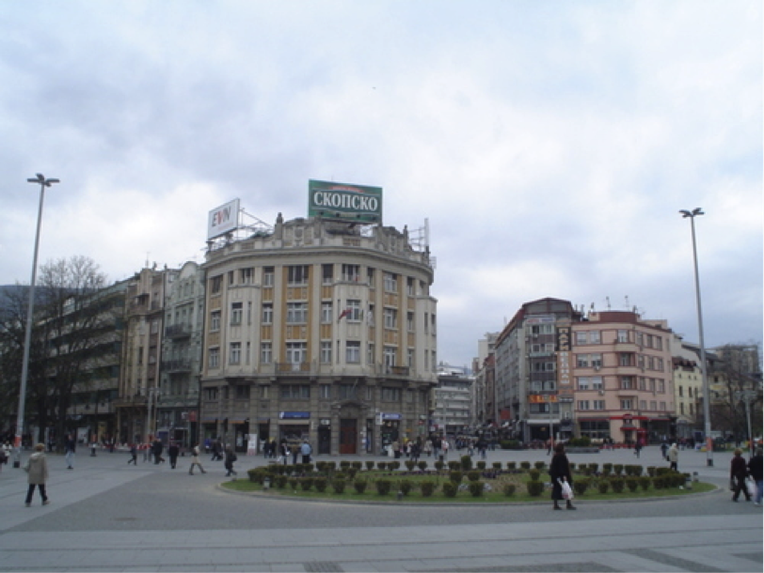
Now, in the place of this flower garden stands a statue of Alexander the Great that rises eight stories in the air. The statue is accompanied by an elaborate fountain that has programs synchronized to classical music and color-changing lights. In addition to the fountain, area around Skopje’s central square now features numerous new buildings and monuments. They include…
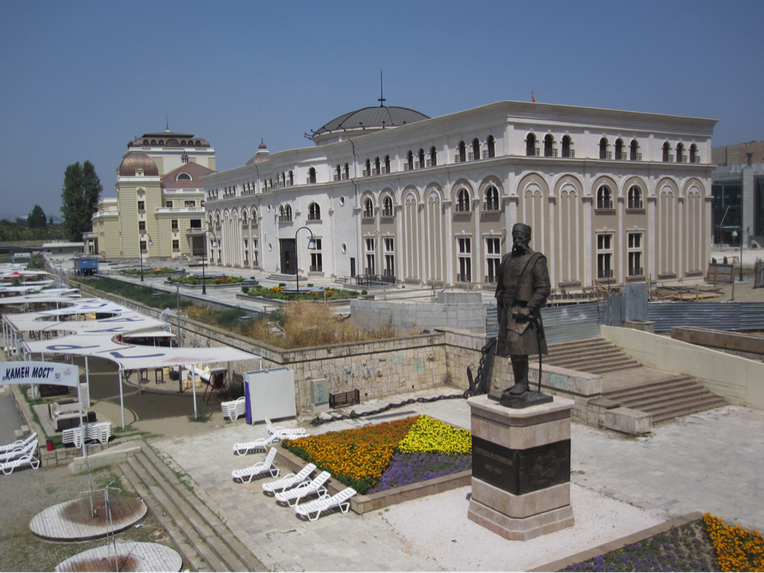
…a wax museum on Macedonian history (foreground) and a reconstruction of the National Theater (background) that was destroyed in a 1963 earthquake…
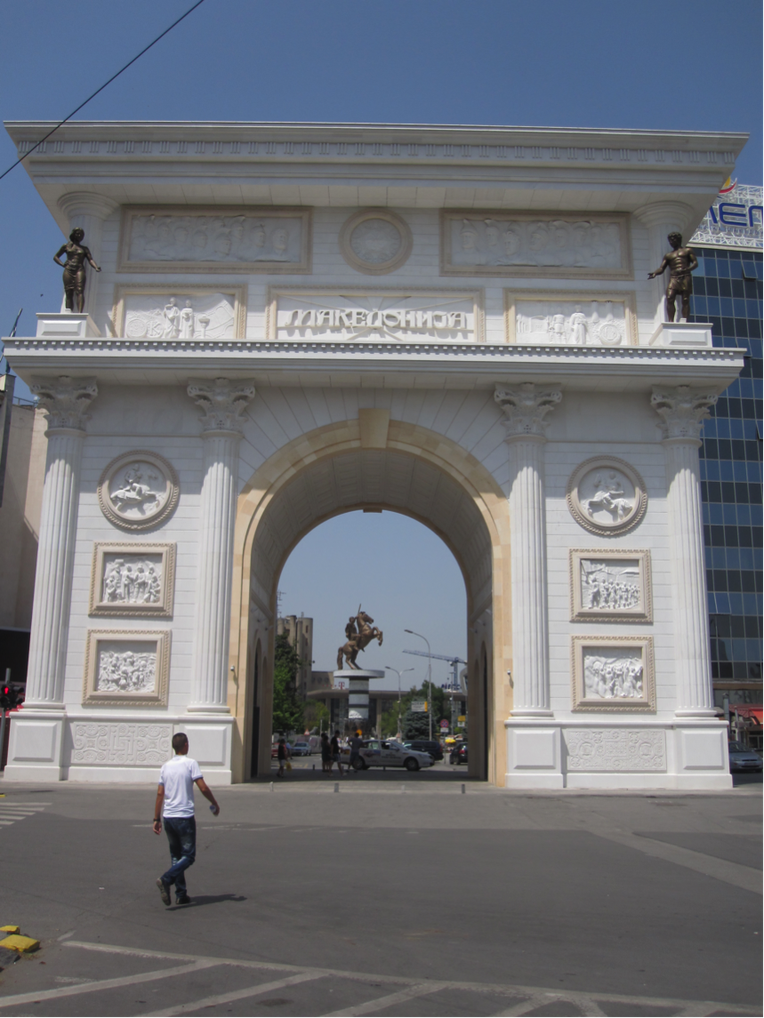
…as well as a new triumphal arch.
These neo-classical and baroque architecture preferred by the Skopje 2014 project contrast with the mid-century modernist style that had prevailed in the city, such as this example of the former Macedonian Telecommunications Building:
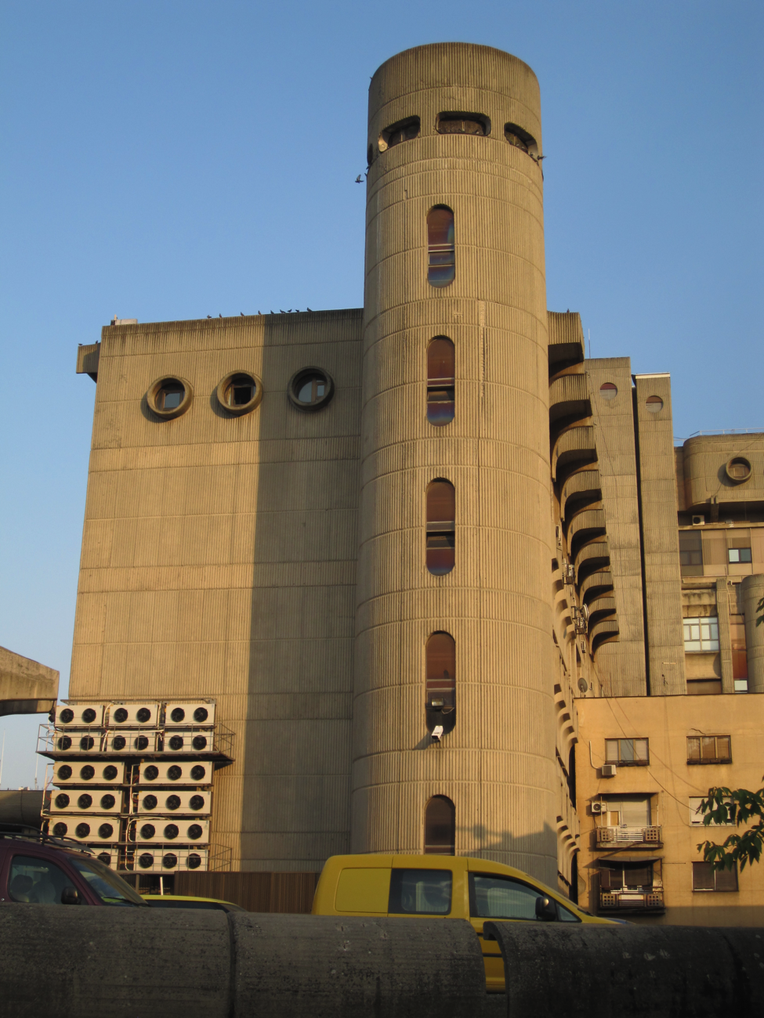
A more comprehensive gallery of photographs documenting progress on the project can be found at: http://www.balkaninsight.com/en/gallery/skopje-2014
The Skopje 2104 project, however, is about more than buildings and monuments. It also strives to make the city recognizable to and desirable for foreign tourists. Alongside the considerable construction, the project also seeks to enhance visitors’ experience of the city through devices such as…
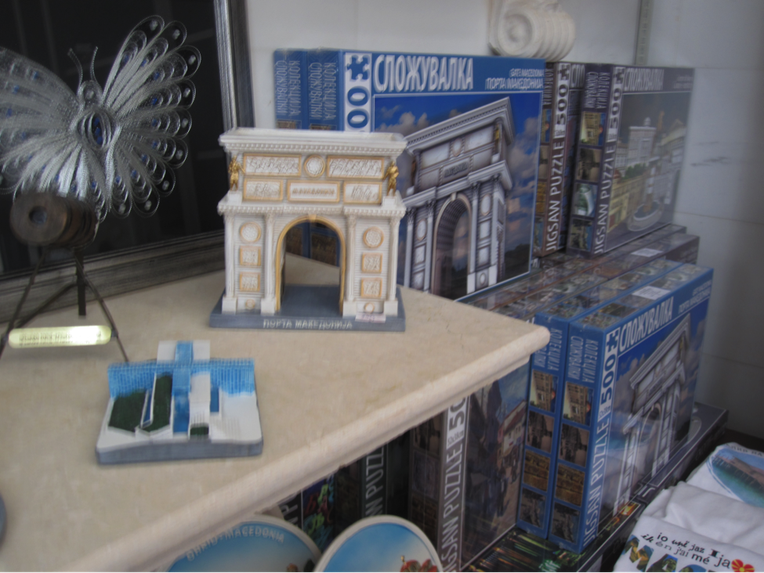
…Skopje 2014 souvenirs…
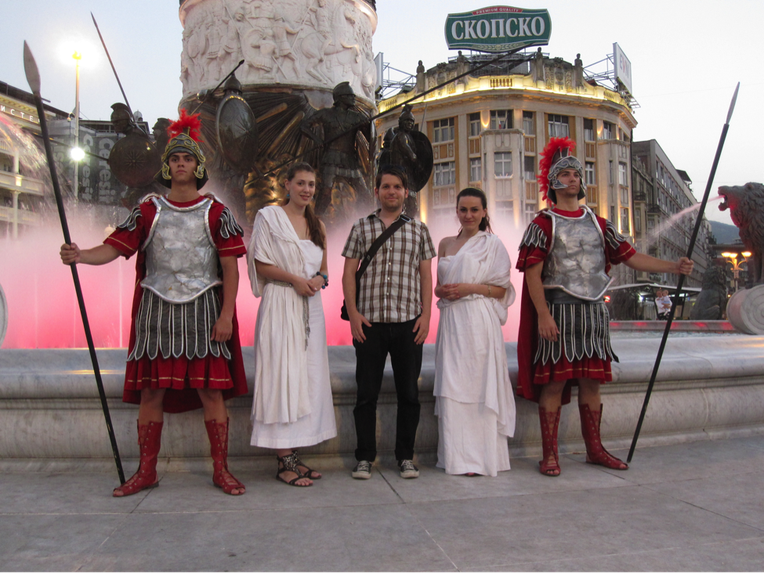
…tour guides and interpreters, such as these four “ancient Macedonians."
Discussion Questions
1) How has the state redefined itself in the neoliberal context of contemporary Macedonia? How pervasive is the redefinition throughout the world?
2) How is the criticism of Skopje 2014 constrained by the discourse of branding? Is the critics decision to use branding as a rhetorical technology a strategic decision on their part or has the discourse limited their ability to criticize?
3) Why, in your opinion, have Albanians and Muslims been left out of Skopje 2014? Are we to understand their exclusion as reflective of neoliberal ideas of brand homogeny, or part of a longer tradition of nation-building?
Related Readings
Anholt, Simon. Competitive Identity: The New Brand Management for Nations, Cities and Regions. New York: Palgrave Macmillan. 2007.
Comaroff, Jean, and John L. Comaroff. Ethnicity, Inc. Chicago: University of Chicago Press. 2009.
Fehérváry, Krisztina. "American Kitchens, Luxury Bathrooms, and the Search for a 'Normal' Life in Postsocialist Hungary." Ethnos 67.3(2002):369–400.
Ferguson, James, and Akhil Gupta. "Spatializing States: Toward an Ethnography of Neoliberal Governmentality." American Ethnologist 29.4(2002):981–1002.
Graan, Andrew. "On the Politics of Imidzˇ: European Integration and the Trials of Recognition in Post-Conflict Macedonia." Slavic Review 69.4(2010):835–858.
Perry, Richard Warren, and Bill Maurer, eds. Globalization under Construction: Governmentality, Law, Identity. Minneapolis: University of Minnesota Press. 2003.